Escape From LA
It seems like everything wrong about the country has converged in a single location in Los Angeles, exploding into a massive, uncontrollable inferno.
Apocalyptic images coming out of Los Angeles:
This one was taken by a passenger aboard a flight in the process of landing, I’m assuming at Los Angeles International Airport:
2025 is off to quite a start, isn’t it?
Wildfires aren’t uncommon in Los Angeles, obviously. But this wildfire is something else. Observers have noted that they’ve never seen something like this in all their years of monitoring Southern California wildfires. There’s considerable speculation that these fires may not be naturally-caused, not entirely, but for now, that remains speculation. There’s footage purportedly showing fires being deliberately set, along with suspects taken into custody on suspicion of arson, but this doesn’t mean it was the reason why the fires broke out in the first place.
Currently, there are four main fires: Palisades, Eaton, Hurst, and Sunset. There have been several other fires as well, with seemingly no end in sight. Firefighting crews are working around the clock with limited manpower and resources, with reinforcements coming from Arizona, as well as the California National Guard, to assist.
Arguably, the most destructive was the Palisades fire. Entire neighborhoods have been destroyed:
Here’s what it looked like before:
A number of people have mentioned that the Palisades fire has burned over 17,000 acres, whereas Manhattan is little over 14,000 acres in size, giving shocking perspective on the scale of the devastation. Worst of all, there are now 24 deaths attributed to the flames. There’s plenty of time for more death and destruction, as the fires are still mostly not contained.
The fires are still an unfolding story, but it’s not too early to share some thoughts in reaction to it. It’s a perfect example of an SHTF in progress, so this is as good a time as any, as preppers, to glean some lessons from it.
Let’s talk about it.
Prepare For The Most Likely SHTF In Your Area
Anyone dedicating their preps to civil war, revolution, or a total societal collapse is an idiot who deserves ridicule. Period. These are once-in-a-lifetime events you may not even live long enough to witness. I believe I’ve said this a thousand times since starting this blog. You’ll be the victim of a natural disaster long before you’re a victim of some of these more dramatic events.
The same way hurricanes are an annual threat to Florida and the Gulf Coast, wildfires are an annual threat to Southern California, as are earthquakes. If you live in these areas, you need to have a plan to in place to deal with them. Zero excuses. No, you’re not stopping a hurricane nor a wildfire. But what you can do is harden your residence to perhaps better withstand a natural disaster or, more importantly, have an emergency plan in place so you and your family can get the hell out of Dodge when the stuff hits the fan.
You don’t even need to be a hardcore prepper. Your plan can be as simple coming up with a procedure for how you’re going to get in touch with everyone, where everyone is going to meet, what you’re going to pack inside your go-bags, how you’re going to reinforce your home, and where you’re going to go if evacuation becomes necessary. Though the plan might be simple, it’s important to sweat the details. For example, traffic will become an issue during SHTFs. Which roads are you going to take? Are there alternate means of getting out of town to your bug-out location?
Speaking of bug-out locations, these don’t need to be a cabin in the mountains far from the city. It can be as simple as a family or friend’s residence outside the affected area. Or it can be a hotel. The important thing is to have your mind made up ahead of time as to where you’re going to go when it hits the fan. Having options isn’t a bad idea, either, especially if the disaster impacts a large area. You always need to have alternate plans you can shift to immediately in case your primary plan doesn’t work out.
Disasters destroy your most important belongings. Make sure you consolidate your important documents, like insurance policies, birth certificates, titles to any property you own, in a secure location, remembering to take them with you when it’s time to bug out. If there are any keepsakes you absolutely cannot afford to lose, even for sentimental reasons, don’t forget where you keep them. During an SHTF isn’t the time to be rummaging through your residence looking for things. Again, you need to have a plan and when the SHTF strikes, the time to prepare has passed and the time to execute has come.
This isn’t the essay for going deep into the weeds on how to prepare for SHTFs, so I’ll just say to do your research and then actually formulate a plan in writing. Create checklists, a whole manual, if needed, and go over them periodically to keep everyone refreshed and avoid complacency. We all lead busy lives, but it’s worth it to practice your plans as well. In fact, it’s probably more fun for most people to practice reacting to an emergency more than it is to talk about it.
For example, Brian Duff over on the Mind4Survival podcast suggested playing a game with your kids to see who can get their bug-out bags and out the door the fastest. Clearly, games don’t work as well on adults, but there are other ways of making practice enjoyable. One way to do it is to incorporate them into your daily routines. For example, when heading out the door, practice doing so in ten minutes or less. Preparedness is a lifestyle, after all.
This is obviously easier said than done. Personalities differ and it’s quite common for people to resist entertaining discussions on how to deal with emergencies, because it ruins their good time or they think just talking about it makes it more likely. It’s stupid, to put it bluntly, but also a fact of life you’re going to need to consider. I’ve never been someone who tries to force the proverbial horse to drink the water, so what I’d do with obstinate loved ones is to give them the plan in writing, then back away. You cannot force them to listen to you, but you don’t want to leave them out entirely, either. At the very least, you want to be able to say that you tried. Who knows? Maybe when it does hit the fan, they’ll come to their senses. It happens more often than it doesn’t.
There’s a saying: no plan survives first contact. However, this isn’t to say you shouldn’t plan at all. It just means you need to be flexible, ready to deviate from it and quickly implement a different course of action. Having a plan allows you to focus your anxieties towards action, preventing indecision, mental paralysis, and panic.
If you want specifics on prepping, go to the aforementioned Mind4Survival podcast. The latest episode is about wildfire preparedness, but so much of what Brian Duff says can be applicable to wide range of emergencies.
Only Fools Trust The Government
The failures of the Los Angeles City and County governments has been a big talking point in the story. It’s probably worth a separate discussion altogether, and it’s still too early to do a comprehensive postmortem. However, the failures and limits of government can be seen clearly already.
The problem with expecting the government to be there for you is simply a matter of physics. Los Angeles County has 9.6 million people in an area over 4.7 thousand square miles. The county varies in both geography and climate. Any disaster will stretch resources and services to their limits. In that sense, it doesn’t really matter whether you have a positive or negative outlook on government. Nature and numbers make it difficult to save everyone and everything. Defeatist as it may sound, reality will always win.
Even in better-governed areas, governments have to prioritize. Typically, places with greater population concentrations and more vitality to the economy and government will receive more attention. For something like a wildfire, where it’s most intense is usually where resources are devoted. Often, it takes outside support to help areas that were initially assigned lesser priority. This means some people will inevitably be waiting a long time for someone to show up with help.
This is why there’s no substitute for preparedness at a community, household, and personal level. There just is never enough help to go around during an SHTF. Bosnian War survivor Selco Begovic defines an SHTF as a situation where there are more people than resources. Do you follow, now? Calling 911 works in a situation where there’s someone available to respond to your request for assistance. It doesn’t work in a situation where disasters are unfolding everywhere and where hundreds, if not thousands, need help. You’re just never going to overcome the problem of numbers.
Whether the government functions properly or not during a crisis, understand that you cannot rely on them because it’s not up to you when and where they show up. The irony in government is that we have to be able to trust them to handle the situation properly on their own, but this also means we cannot dictate to them how to do their jobs. Worse, we live in a managerial state presenting itself as a democracy, meaning nobody in charge is responsible for anything. It’s in a crisis that the truth becomes apparent.
You’ll See The True Face Of Your Leaders
As stated in the closing of the preceding section, it’s in a major crisis that you’re going to learn, often for the first and only time, whether your leaders are really up to the task or not. Again, the poor quality of both Los Angeles and California leadership has become a major talking point during the wildfires and the proof is really in the pudding. It’s during times of crisis where the quality of leadership will be exposed for all to see.
Look at what Governor Gavin Newsom said when asked about the lack of water situation:
I don’t doubt that there’s a grain of truth to what Newsom said, but that’s not what a leader should say during an emergency. There are a million different things he could’ve said besides “figure it out.” It’s his job as governor to work around the clock to provide the resources necessary to address a crisis. Nobody’s expecting him to fight the fires himself.
The equally far-left Los Angeles Mayor Karen Bass has also come under fire (no pun intended), even from within the ranks. At the beginning of the crisis, she was on an official trip to Ghana, of all places. I’m not sure why the mayor needs to be going on such long journeys overseas, but the biggest problem is that Bass clearly has priorities other than making Los Angeles a safe and prosperous place to be. That was always clear from the moment she ran for office.
Ana Kasparian, a left-wing political commentator and Los Angeles resident who has recently taken a hard right-turn in her politics, sums up the problem with governance in California and Los Angeles:
CA, and especially LA, is controlled by Democrats. THEY are responsible. No more passing the buck.
Our Mayor, who was in Ghana as fires exploded in our city, cut the fire budget by $17 million. Endless amounts of money funneled to bullshit scammer homeless nonprofits. We’re the highest taxed yet we have encampments and squalor everywhere. Even worse, we don’t have enough firefighters to respond to the absolute disaster we’re experiencing right now. Rather than conserve the record rain we got last year, we just drained it into the ocean. We are a failing city run by a sick excuse for local government.
You want to radicalize people against the modern Democratic Party? Send them to LA.
Kasparian wrote this in response to a tweet stating that almost all the water in California is owned by the billionaire Resnick family. This is who they are [bold mine]:
This is billionaire Lynda Resnick, her family owns 60-75% of the water in California
- Her family donates HUGE amounts of money to Democrats - She donated to stop Gavin Newsom’s recall
- They use over 150 billion gallons of water every year
- Her family was in the 1994 secret meeting that officially ended water being a public right in California
- They're the largest agricultural owners in California, and their farms use more water than all homes in Los Angeles combined
- Lynda and Stewart Resnick own Fiji Water, POM Pomegranate Juice, Wonderful Pistachios, and many other food companies
- They've faced lawsuits related to their water management practices, with allegations of profiting from selling water stored in the Kern Water Bank to non-members at a profit, violating public utility laws
- The Resnicks have been accused of using their wealth to influence water policy and politicsThey pay off Democrats and Gavin Newsom specifically to keep their scam going
The cynical response would be that corruption and politics go hand-in-hand. Donald Trump, too, is a corrupt figure. However, when that corruption leads to government incompetence, that’s not the time to be cynical. People will tolerate corruption as long as the results are good. When the results are bad, it needs to be called out.
Back to Bass: as Kasparian says, she prioritizes things like Diversity, Equity, and Inclusion over more critical functions of government, like fire protection. In a stunning moment of breaking ranks, the Los Angeles Fire Chief, herself a lesbian woman, openly criticized Bass for defunding the department. How she didn’t get fired for criticizing her superior, during a crisis, no less, we may never know. But it proves that perception may, in fact, be reality.
The point isn’t that Governor Newsom or Mayor Bass were responsible for the fire. The point is that people like Newsom and Bass will boast themselves as government as it should be, examples of why government is indispensable and irreplaceable, along with insisting on taking even more of our money in taxes, but then ultimately show themselves as having no answers to any of our problems. We’re expected to continue to feed a system that won’t even take responsibility for things they took on of their own volition!
Michael Shellenberger, who challenged Newsom for the governor’s office a few years ago, had a fierce rebuke for the poor leadership on display:
Over the next few weeks you’re going to hear Governor Gavin Newsom, Mayor Karen Bass, and the Democratic Party tell you that there’s nothing that could have been done to prevent the fires from destroying Los Angeles.
Those will be lies. They could have prevented them. Governor Newsom cut the funding for preventing forest fires and failed to build sufficient water resources for fighting fires. Mayor Karen Bass cut $17.5 million in funding for the Los Angeles Fire Department and then went to Ghana even though she knew of the risk of catastrophic fires.
It’s true that California, in general, and Los Angeles, in particular, are fiery places. It’s true that the Santa Ana winds made the fires worse.
But Newsom and Bass have known about those hazards for all of their careers and failed to deal with them. Their rank incompetence and lack of leadership are shocking and scandalous.
It’s hard to overstate how badly they screwed up water management. LA firefighters haven’t had the water they needed. Newsom hasn’t built the new water reservoirs that Los Angeles needed. And Newsom even cut the budget for water infrastructure projects last year.
Why is that? Part of the reason is that they were focused on other things. Making the fire department more racially diverse. Climate change. Homelessness.
Remember: we’re always lectured to by our betters why we need to pay lots of taxes and give the government more authority over our lives: roads, water, and firefighting. Well, the last two have been completely lacking throughout this incident. So why should we keep paying taxes? Why should we keep giving the government more power to run our lives if this is the best they can manage when we need them the most?
It’s also in the aftermath of a crisis the government will demand even more power and more money. The fact is, all they’re doing is asking for more opportunities to screw up. Unfortunately, many people will acquiesce, because they see no alternative to the status quo, are too afraid to try something new, or because they simply don’t know anything else.
This pathetic display of leadership extends to the national level as well. Look at what Democratic Congresswoman Pramila Jayapal tweeted about the wildfires:
Jayapal never does elaborate on what exactly the corporations did to cause the wildfires. Nor has she nor anyone else convincingly argued that climate change has anything to do with the wildfires, which have been a problem in the region for thousands of years. The Santa Ana winds, which contribute mightily to creating conditions where wildfires are likely, have also existed for thousands of years. They’re the product of geography, not human activity. During times of crisis, politicians will say the stupidest things because they know they have an audience that’ll gobble it up and also because they think it’s a perfect time as any to get some cheap shots in against those they hold grievances against.
Speaking of grievances, I think we can all agree that someone like this should never wear the uniform, nor get paid to save lives:
Kristine Larson is still an Assistant Chief, undoubtedly playing a key role in the response to the fire. Honestly, I don’t care how good she might be at her job. She can do it for free. Someone who’d say this publicly, while wearing the uniform, no less, shouldn’t be paid taxpayer dollars. When screening applicants for public safety positions, one of the things they look for are red flags just like this: contempt for the people you might be forced to come to the aid of.
She might be able to get away with this since she’s an Assistant Chief, but it’d probably disqualify her from hire or even get her fired if she wasn’t a chief. We all have our deep, dark opinions, but normal people express them behind closed doors. The fact she said this aloud shows tremendously poor character and judgment on her part, and the fact she was apparently never disciplined for it shows the culture of the Los Angeles government is rotten to its core.
Remember: these are the same people who’ll police firefighters for “insensitive” speech or thoughts, the same firefighters who’d enter burning buildings without a second thought to save anyone of any race, gender, or sexual orientation, whether they got themselves in the wrong place or not. That’s because they understand, better than the Assistant Chief, what things like duty and honor stand for. The problem with DEI is that it puts compromised individuals in positions of great responsibility. It was never about serving the public more effectively. It’s about being in a position to reward preferred in-groups and punish those whom they hold grievances toward.
The Los Angeles wildfires are proving to be a real-life example of what progressive, DEI-laden government looks like under pressure. The results have been disappointing, to say the least. The people running both the city and the state are proving that activists don’t make for good governance, because governance isn’t about saving the world. It’s about doing the dirty, thankless jobs that keep civilization up and running at all hours.
I think this about sums it up:
Something you see in local government is that officials who intellectualize everyday problems and talk about “changing the world” are incapable of fixing potholes and replacing sewer lines. It’s usually the boring, quiet ones who keep the lights on.
There Will Be Disorder. You Can Count On It.
Like so many things related to the wildfires, I could write an entire essay on this. As with all disasters, there has been looting in the wake of the fires, as people have been forced to abandon even unburned homes and law enforcement is overwhelmed.
In fact, the looting problem seems to be industrial scale:
In another instance, large numbers of vehicles, some with blacked-out license plates, attempted to enter neighborhoods before being turned away. The quickness with which they turned around, along with the blacked-out license plates, suggests they weren’t coming to volunteer help.
In fact, some Los Angeles residents have put together neighborhood watch teams who communicate using messaging applications such as WhatsApp to be on the look out for looters. The next logical step up from neighborhood watch is an armed militia, but I doubt there are enough gun owners or, more importantly, gun culture for that to happen quite just yet. Private security companies are also getting involved in providing security during a disaster, as looters are running sophisticated operations, utilizing sprinter vans to get quickly in and out.
In Santa Monica, 10 burglary suspects have been arrested in the areas where residents were ordered to evacuate, with a mind-blowing 29 more arrested for other crimes since the start of the fires:
Look at all these incidents in a short period of time in Los Angeles’ most expensive neighborhoods:
If this is what’s happening at a time when the rule of law is more or less still in place, imagine what happens in a situation where the rule of law breaks down.
More concerning are the arson attempts, the number of which seems to grow by the day. At least one major fire specifically is being investigated as deliberate. You have people impersonating firefighters trying to gain access to evacuation zones to ignite more infernos. In the most publicized case, a man with a blowtorch was caught by residents of the neighborhood in a manner akin to how Richard “Nightstalker” Ramirez, the infamous serial killer who menaced Los Angeles in the 1980s, was taken into custody. In fact, many of the arsonists who’ve been caught were initially stopped by residents, proving that during an SHTF, the citizenry has to step up to danger, whether they want to or not.
But wait - there’s more! The man with the blowtorch turns out to be an illegal immigrant from Mexico. Immigration and Customs Enforcement (ICE) plans on requesting custody of him, but they don’t expect it to be granted, since California is a Sanctuary State. It seems like everything wrong about the country has converged in a single location in Los Angeles, exploding into a massive, uncontrollable inferno.
Like I said, I could devote an entire essay to this topic alone. I’ll close by suggesting you read this long tweet by “Don Shift,” California resident and retired police officer. It’s great advice on how to protect your homes and neighborhood from looters during an SHTF.
The Government Will Attempt To Stay Relevant
If I sound unrelenting in my criticism of the government, it’s because so much of what they do doesn’t make any sense.
In Santa Monica, they were still issuing parking tickets despite a fire threatening the city in the background:
The person who filmed the video contextualized it by saying it was street-sweeping day (you can see it at the beginning), but I don’t think it really changes anything. I’m not sure I can criticize it too much, either. Government needs to remain functional through a crisis, after all. It’s the point. Nor is a crisis ever a time for the public to start flouting the rules. At the same time, I think it’s reasonable to expect the government be able to prioritize what’s most important in a given situation. With a massive blaze threatening the city and people’s minds focused on the danger it poses, is parking enforcement really that important?
Again, I’m not sure I have much of a leg to stand on here, but sometimes, it just doesn’t look right. Continuity of government and keeping things orderly are absolutely vital during a crisis, but I also don’t think not enforcing parking rules is going to threaten any of that. Governments should attempt to simplify things and not add to the list of headaches during a crisis. Then again, would they really be the government if they weren’t always trying to take more of your money? There’s a running joke that collecting taxes and fines is the one thing the government never fails at. It’s true.
The frivolousness is on display everywhere. The health department intervened over a hot dog vendor who was providing food and drinks to firefighters for free. You could make the argument that there are risks in accepting food and drinks from strangers, but if you can’t even feed your first responders and neighbors during a disaster without the government’s say-so, what’s the point? Why accept anyone’s help, ever? Is this the kind of world we want to live in, where we can’t trust our own citizenry?
I bring up these examples mostly to show you what “The End,” whenever it comes for America, will look like: government workers and troops will follow the last order given or await orders that never come, abandoning their posts only when it all goes quiet, or when the paychecks stop coming in. There’s something reassuring about the state’s resiliency, but also troubling in that it takes a very, very heavy dose of reality for them to start acting like humans again.
The Will To Survive
I’ve been sharing lots of bad news here. Let’s close with some better stories. As much awfulness as the fires have exposed, it’s also in times like these we see the very best in us.
Here’s a man braving the intense heat to hose down a neighbor’s rooftop to prevent the home from catching on fire:
For those of you who’ve never felt the heat emanating from a raging inferno, it’s BLAZING. The turnout gear worn by firefighters provides some protection from it; without it, for anyone to get as close as the man seen in the photograph above does to those flames requires a tremendous amount of bravery.
You also have the man who stayed behind and fought the flames using a garden hose, saving the home his parents built in 1960, while all the other homes around him burned down. Call him foolish if you’d like, but it goes to show you that a home is more than property. We become attached it our home because it’s the physical manifestation of our hard work and all the memories that make up the experience of life. I’d rather live around people who treasure their homes to where they’d risk their lives for it than to live around those who treat everything, lives included, as disposible.
Then you have neighbors banding together, using buckets of water to try and douse the flames. Call them feckless if you’d like, but again, I’d rather live around people who’d try and fight the fires than those who run at the first sign of trouble. Civilization may be maintained by the competent, but it always starts with people willing to risk life and limb to preserve what we have worked so hard to build.
It often takes a reminder, but this country is full of resilient, selfless people who’ll risk everything for their neighbors. It doesn’t change the fact America has existential social problems, but hard times prove that the ingredients for strong social bonds are still there. We just have to find it again and learn, the first time for many of us, that we’re nothing without responsibilities to one another..
I don’t know what it’ll take, but again, I’m not here to solve the world’s problems. Just remember what Queen Elizabeth II once might’ve said had the balloon gone up and the stuff really hit the fan. I keep coming back to this because, well, it’s all there is to it:
“It is this close bond of family life that must be our greatest defence against the unknown.
“If families remain united and resolute, giving shelter to those living alone and unprotected, our country’s will to survive cannot be broken.
“My message to you therefore is simple. Help those who cannot help themselves, give comfort to the lonely and the homeless and let your family become the focus of hope and life to those who need it.
It’s a message for all times and conditions.
Finally, remember that Western North Carolina hasn’t recovered from its own SHTF last year and it’s not clear if it ever will. Nobody cares about Western North Carolina the way they care about Los Angeles. There are many of reasons for this - politics and race included - and it doesn’t change the reality of human suffering ongoing in the American heartland. When the end finally comes for the prevailing political order, it’ll be disasters like the one afflicting Western North Carolina, as well as Los Angeles, which will be regarded as having been its undoing, similar to how Chernobyl came to be seen as the disaster which undid the Soviet Union.
Time for discussion: what’s your reaction to the Los Angeles wildfires? Do you think criticisms of the government’s actions or inaction are valid? Will any long-term consequences emerge in the aftermath? Or will we just forget about it, sweep everything away, rebuild, and move on like nothing ever happened, like we often do?
Talk about it in the comments section.
Max Remington writes about armed conflict and prepping. Follow him on Twitter at @AgentMax90.
If you liked this post from We're Not At the End, But You Can See It From Here, why not share? If you’re a first-time visitor, please consider subscribing!
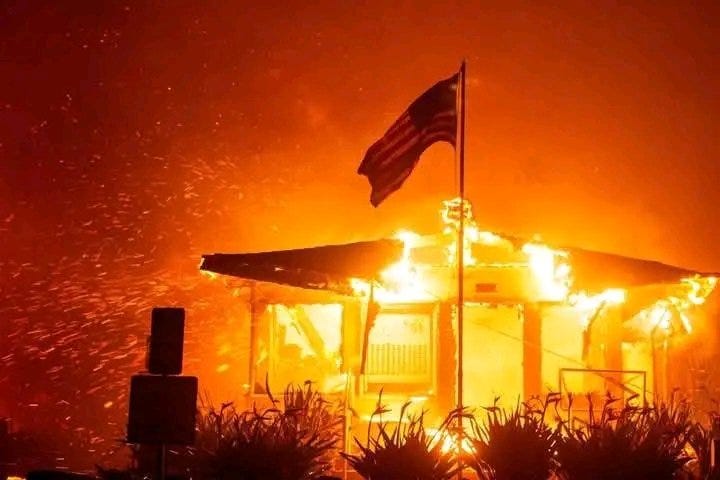
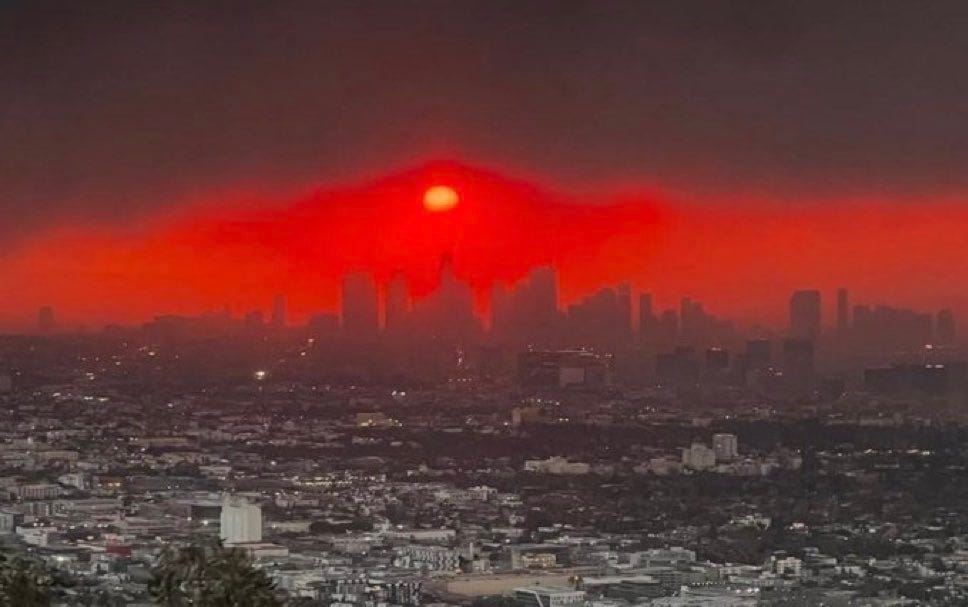
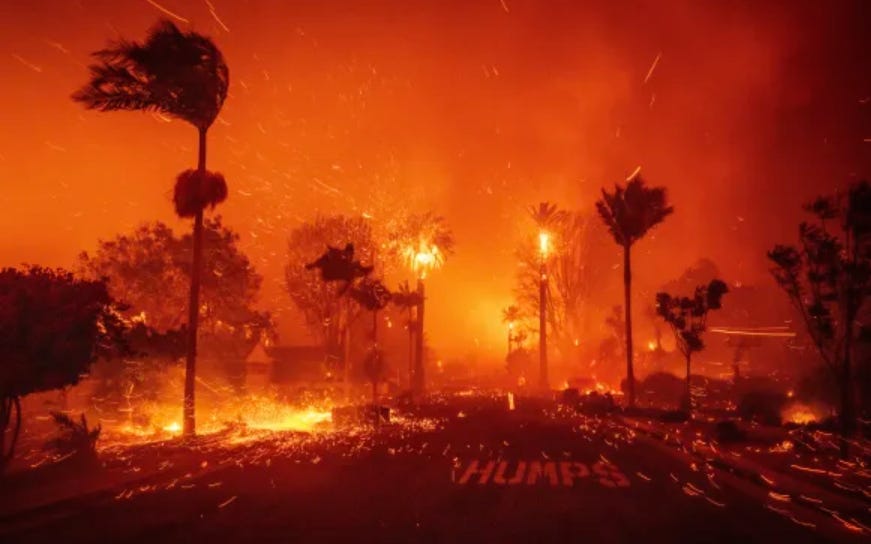


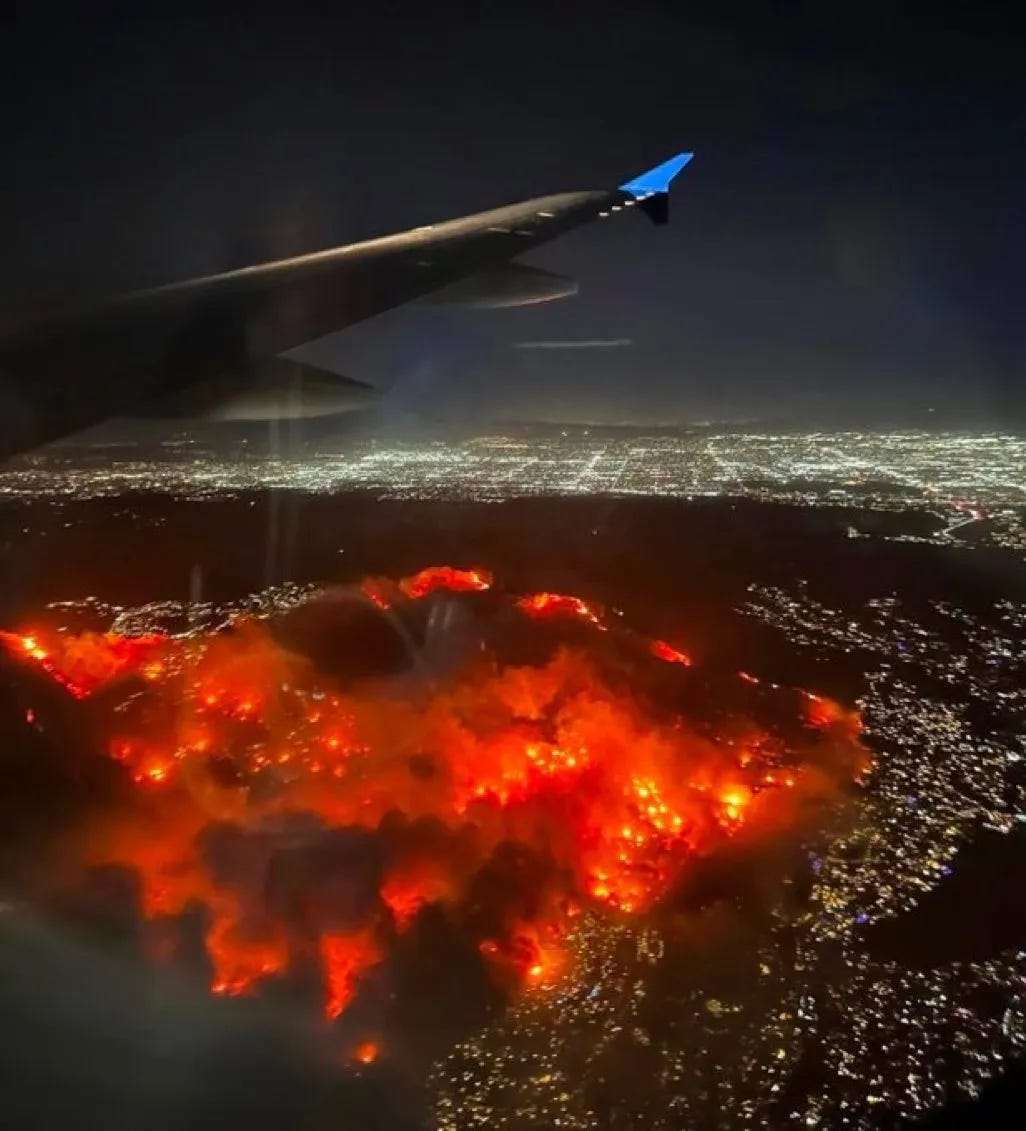
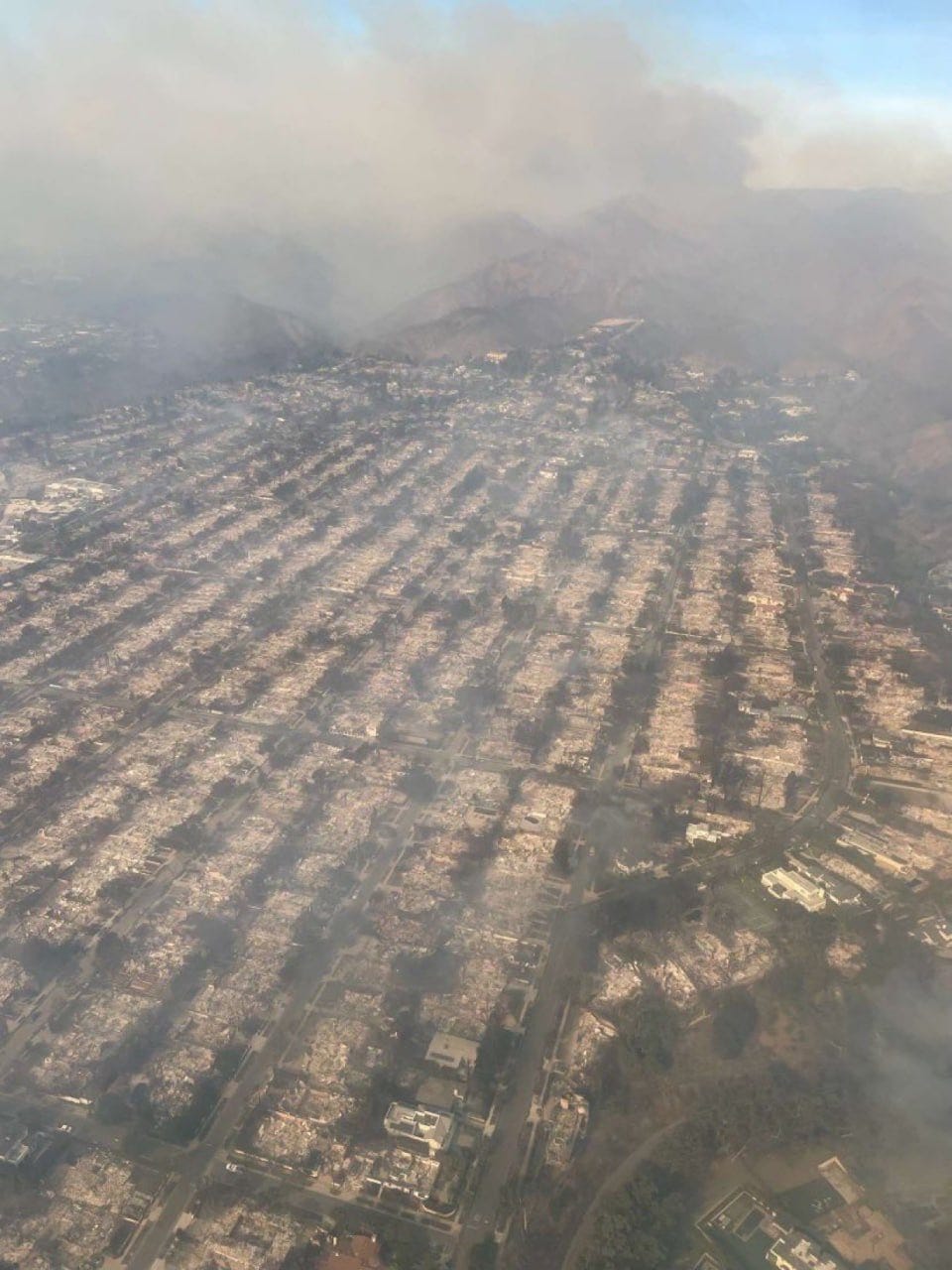

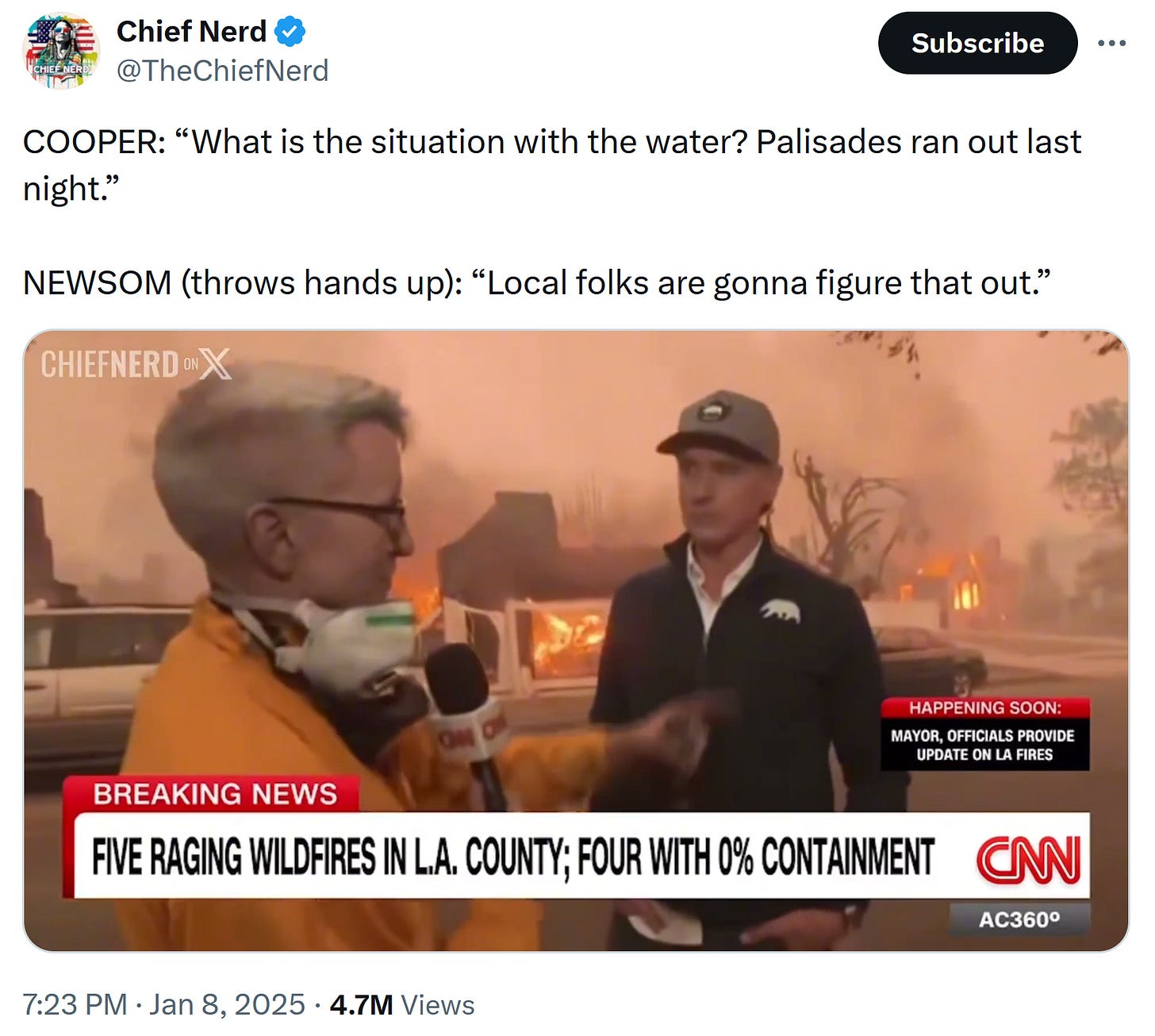



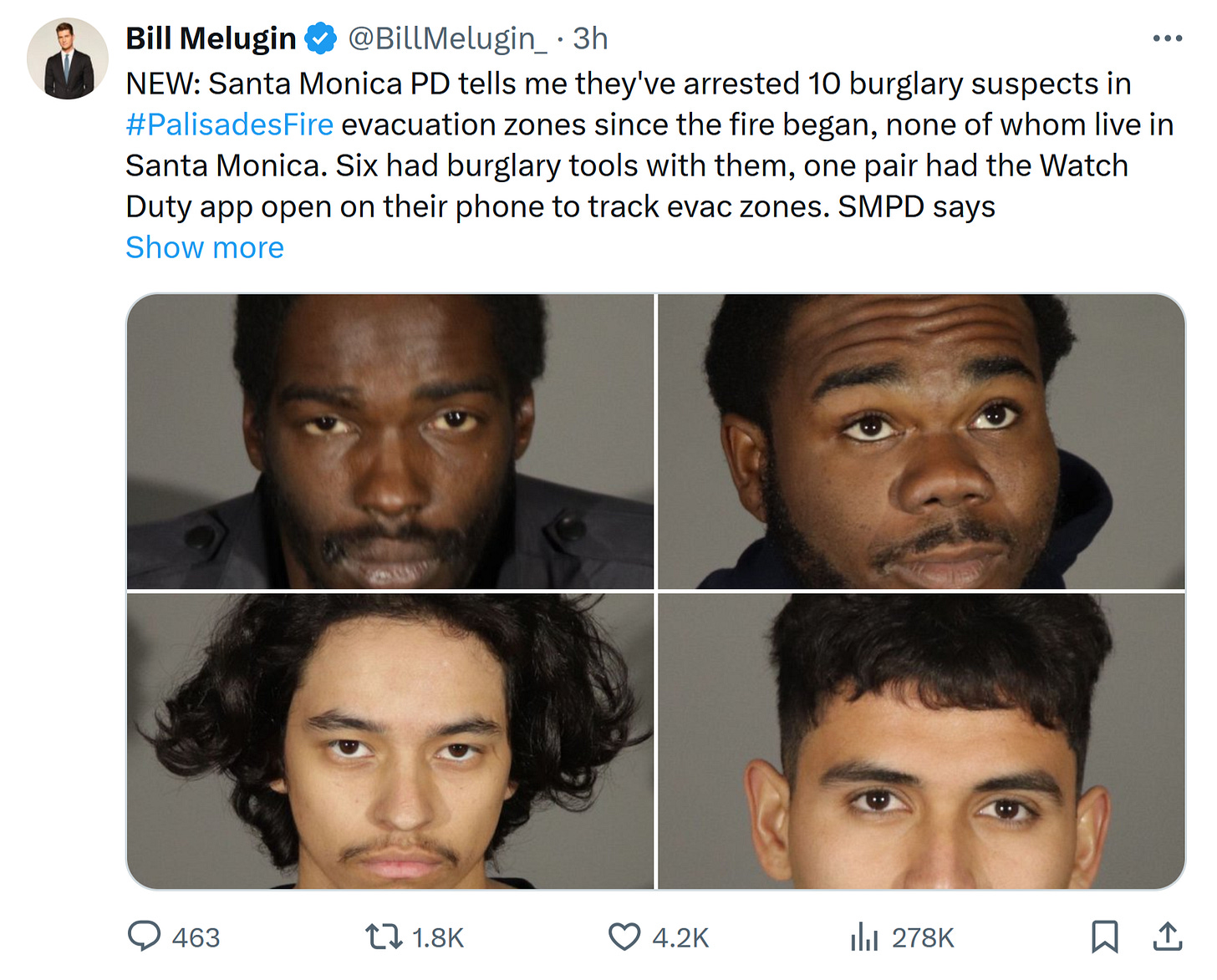
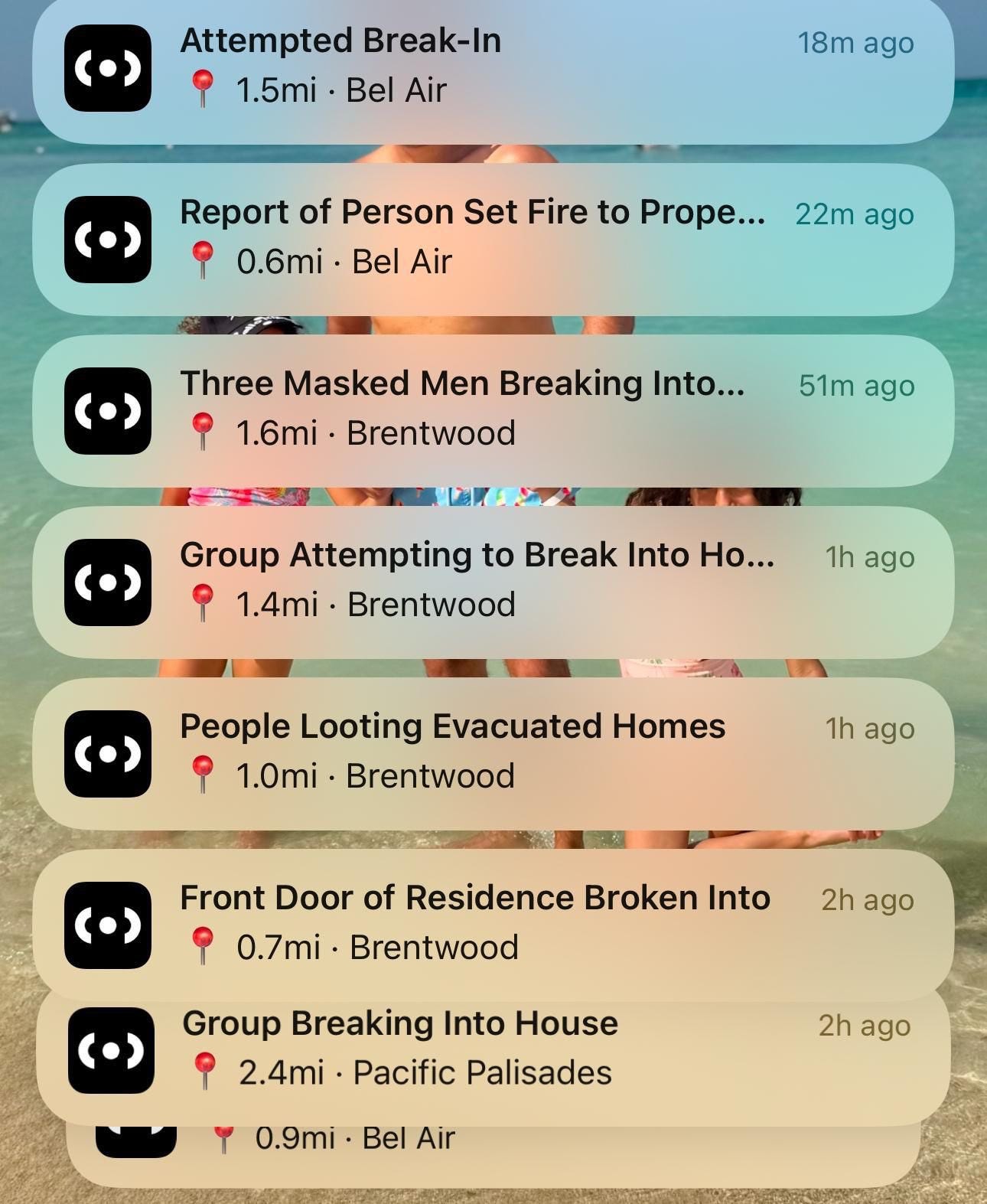


Tons of excellent advice here. Big picture: when disaster strikes, as best you can, get yourself prepared to be a helper (at the very least to yourself, and hopefully others), and not to be in need of it. Not necessarily easy to do, but at least keep that idea in the back of your mind at all times.
As I read this, I'm watching Tucker Carlson's interview with Michael Shellenberger. I commend it to everyone. One of them, I forget which, ventured, and the other agreed, that southern California is so dysfunctional that after the conflagration ends, it will in time become evident to people that a Californian version of Bukele will be required to save it.
I think this is true, and I think if it happened, it would stretch the boundaries of constitutional government close to the snapping point. Still, our system is tensile enough to accommodate it.